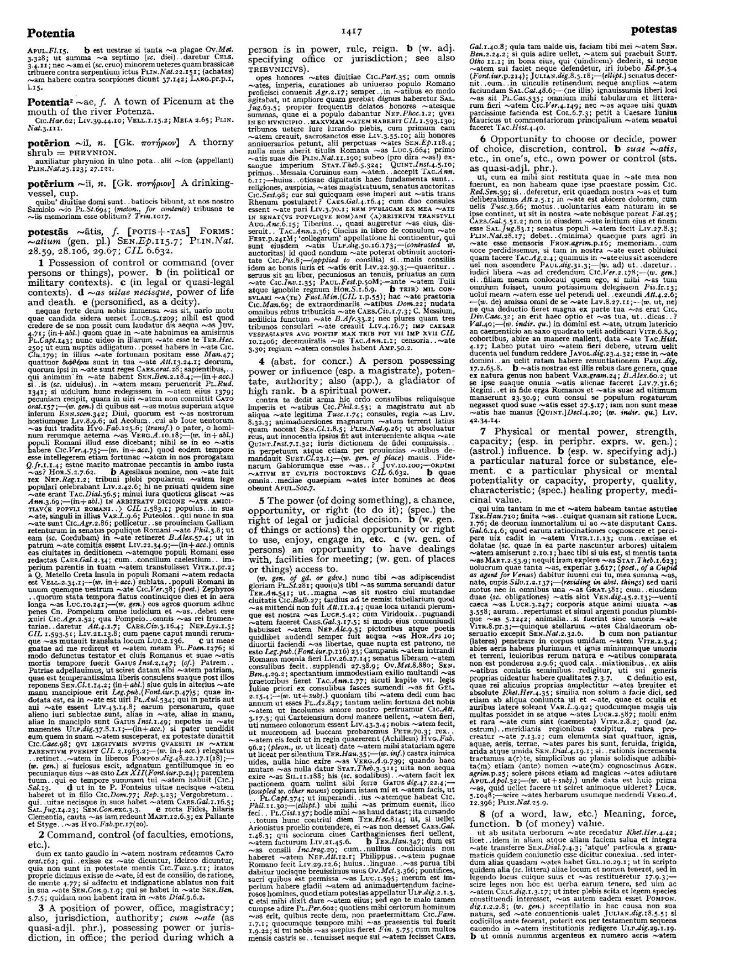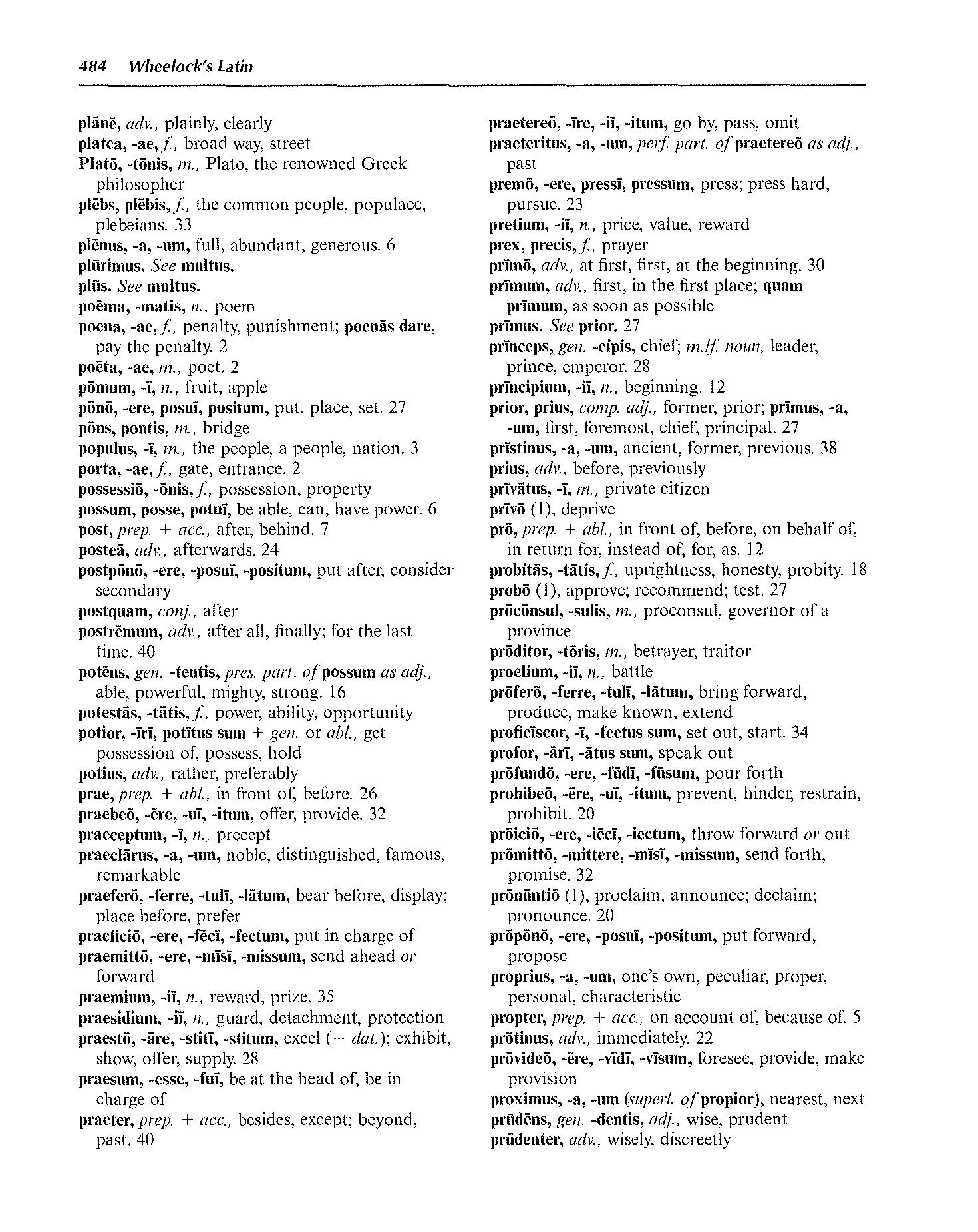
page_listing.tpl
page_subListingDetails.tpl
sub_listingDetails_style1.tpl
sub_listingDetails.title.tpl
potestās power
potestās is a Latin Noun that primarily means power.
Definitions for potestās
Wheelock's Latin
Noun
- 1
power, ability, opportunity
Oxford Latin Dictionary
Noun
- 1
Possession of control or command (over persons or things), power. (b) (in political or military contexts). (c) (in legal or quasi-legal contexts). (d) ~as uitae necisque, power of life and death. (e) (personified, as a deity).
- 2
Command, control (of faculties, emotions, etc.).
- 3
A position of power, office, magistracy; also, jurisdiction, authority; cum ~ate (as quasi-adjl. phr.), possessing power or jurisdiction, in office; of the period which a person is in power, rule, reign. (b) (w. adj. specifying office or jurisdiction; see also TRIBVNICIVS.
Sentences with potestās
Latin to English
Ad hoc sacramentum adacti sumus, ferre mortalia nec perturbari iis, quae vitare non est nostrae potestatis. In regno nati sumus; deo parere libertas est. [De vita beata, XV, 7]Compare This is the sacred obligation by which we are bound - to submit to the human lot and not to be disquieted by those things which we have the power to avoid. We have been born under a monarchy; to obey God is freedom.
Exeat aula, qui vult esse pius. virtus et summa potestas non coeunt.Compare Let him who would be just quit the imperial courts. Virtue and supreme power are incompatible.
Cui peccare licet, peccat minus; ipsa potestas semina nequitiae languidiora facit.Compare She to whom erring is free errs less; very power makes less quick the seeds of sin.
Filius is tribunus miles consularis potestas declaror.Compare His son was declared tribune of the soldiers with consular power.
Declension table for potestās
Cactus2000
| Singular | Plural | |
| Nom. | potestās | potestātēs |
| Gen. | potestātis | potestātum |
| Dat. | potestātī | potestātibus |
| Acc. | potestātem | potestātēs |
| Abl. | potestāte | potestātibus |
Data sources
Notes
- Definitions
- Frederick M. Wheelock, Wheelock's Latin, 6th ed., rev. Richard A. LaFleur (New York, NY: HarperCollins Publishers, 2005): 484.
- P. G. W. Glare, Oxford Latin Dictionary, Vols. 1-8 (Oxford: Clarendon Press, 1982): 1417.
- Word frequencies
- Christopher Francese, "Latin Core Vocabulary," Dickinson College Commentaries, last modified 2014, http://dcc.dickinson.edu.
- Paul B. Diederich, The Frequency of Latin Words and Their Endings, PhD diss., (Columbia University, 1939).
- Louis Delatte, Suzanne Govaerts, Joseph Denooz, and Etienne Evrard, Dictionnaire fréquentiel et index inverse de la langue latine [Frequency Dictionary and Inverse Index of the Latin Language] (Liège, Belgium: Laboratoire d'analyse statistique des langues anciennes de l'Université de Liège [L.A.S.L.A.], 1981): 123.
Bibliography
Allen, Joseph H. Allen and Greenough's New Latin Grammar for Schools and Colleges: Founded on Comparative Grammar. Edited by James B. Greenough, George L. Kittredge, Albert A. Howard, and Benjamin L. D'Ooge. Boston, MA: Ginn & Company, 1903.
Crystal, David. A Dictionary of Linguistics and Phonetics. 6th ed. Oxford, UK: Blackwell Publishing, 2008.
Delatte, Louis, Suzanne Govaerts, Joseph Denooz, and Etienne Evrard. Dictionnaire fréquentiel et index inverse de la langue latine [Frequency Dictionary and Inverse Index of the Latin Language]. Liège, Belgium: Laboratoire d'analyse statistique des langues anciennes de l'Université de Liège (L.A.S.L.A.), 1981.
Diederich, Paul B. The Frequency of Latin Words and Their Endings. PhD diss., Columbia University, 1939.
Francese, Christopher. "Latin Core Vocabulary." Dickinson College Commentaries. Last modified 2014. http://dcc.dickinson.edu/latin-vocabulary-list.
Gildersleeve, Basil L., and Gonzales Lodge. Gildersleeve's Latin Grammar: Third Edition, Revised, and Enlarged. 3rd ed. London, England: Macmillan and Co., 1903.
Glare, Peter G.W. Oxford Latin Dictionary. Vols. 1-8. Oxford, England: Clarendon Press, 1982.
Krüger, Bernd. "Latin Conjugation Tables." Cactus2000. Accessed May 5, 2023. https://latin.cactus2000.de/index.en.php.
Pierson, Nick. "Sound of Text." Accessed October 26, 2019. https://soundoftext.com.
Wheelock, Frederick M. Wheelock's Latin. 6th ed. Revised by Richard A. LaFleur. New York, NY: HarperCollins Publishers, 2005.
Wiktionary Contributors. "Victionarium." Wikimedia Foundation, Inc. Updated March 18, 2019. https://la.wiktionary.org/wiki/Victionarium:Pagina_prima.
Citation
Chicago (17th ed.)
Allo Contributors. "potestās, potestātis (n.) - Latin Word Definition." Allo Latin Dictionary. Last modified . Accessed February 20, 2026. http://ancientlanguages.org/latin/dictionary/potestas-potestatis.
Entry created on . Last updated on .







